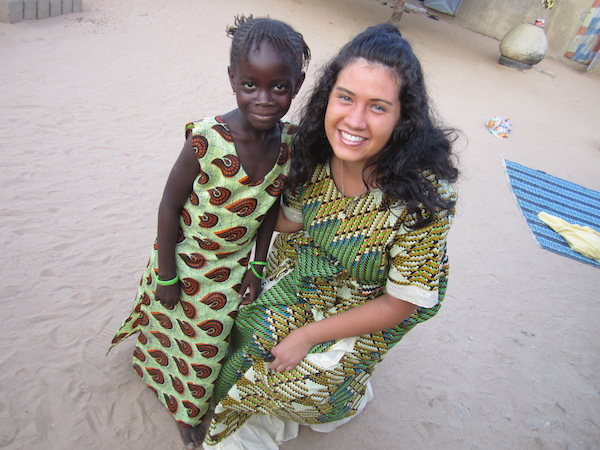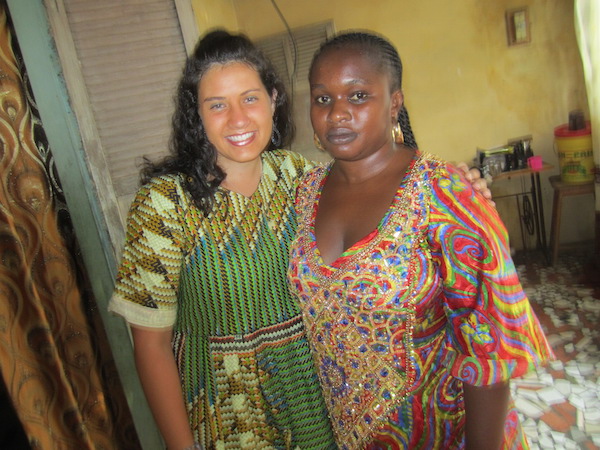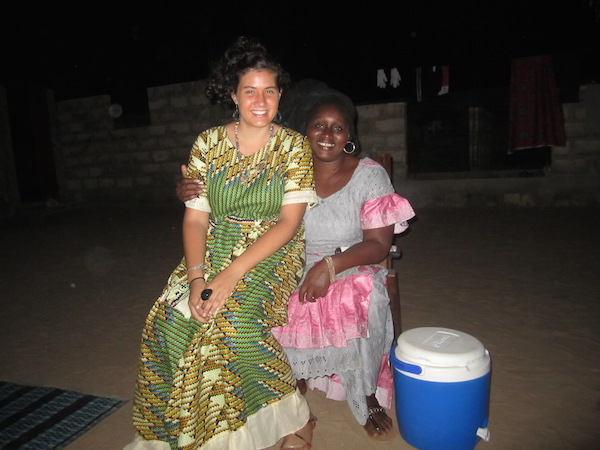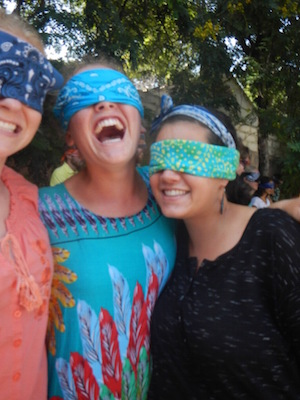Life in Senegal: Excerpts from the Blog of Peace Corps Worker Abby Augarten
- Wednesday, 31 December 2014 12:56
- Last Updated: Wednesday, 31 December 2014 13:04
- Published: Wednesday, 31 December 2014 12:56
- Joanne Wallenstein
- Hits: 10781
 Scarsdale resident and Cornell graduate Abby Augarten is now working in Senegal for the Peace Corps. She is publishing a blog about her experiences there and kindly gave us permission to excerpt portions of it for you. Here are just a few paragraphs from her more extensive posts. Read more here:
Scarsdale resident and Cornell graduate Abby Augarten is now working in Senegal for the Peace Corps. She is publishing a blog about her experiences there and kindly gave us permission to excerpt portions of it for you. Here are just a few paragraphs from her more extensive posts. Read more here:
About Abby:
I graduated from Cornell University in 2013 with a BS in International Agriculture and Rural Development. Looking to apply my agricultural studies outside of the classroom, I moved to the East End of Long Island after college to work in organic vegetable production and dairy farming on two farms. I am now a Sustainable Agriculture Extension Agent with the Peace Corps in Senegal, serving from September 2014 to November 2016
Training: (from September, 2014)
Our group is sixty volunteers in agroforestry, urban agriculture, and sustainable agriculture (that's me!). Everyone has tons of stories to tell and laughs to share, which has made for a fantastic first week; it's a little bit like summer camp. It has been a week full of health and safety trainings, administrative overviews, vaccinations, interviews, cultural lessons, agricultural technical trainings and so much more.
Tomorrow we leave for our Community Based Training (CBT) and I will be in the town of Mbour. During the next couple months we will be dividing our time at our CBT homestay and the Thies training center. I will be at my CBT site with four other volunteers learning Mandinka and our Language and Cultural Facilitator, having language classes during the day and practicing Mandinka and experiencing the culture from my host family! I am prepared to have the language skills of a newborn and embarrass myself to no end, but to laugh it off with my new family.
Abby with Sophia
Abby with her other Mother
Weather:
For those who have been concerned about the weather- yes, it is very hot and humid (though we are spoiled by an air-conditioned classroom). We've had a lot of rain (and power outages) and we are hoping for more. While typically the rainy season would be nearing an end around now, this year has been one of the most unpredictable years for Senegalese climate in the past few decades. With a very late start to the rainy season, everyone is hoping that the rainy season continues so that the crops can reach maturity in time to harvest, or problems with food insecurity would be exacerbated.
Language:
Mandinka is a minority language spoken by approximately 2-3% of Senegal's population. It is primarily spoken in central and southern Senegal, in the regions north and south of the Gambia (it is also greatly spoken in the Gambia). I won't know my permanent site for a couple months but I am so excited! Yesterday we had our first language class and I have a lot to learn! So far I've learned the word for cow (niiso), so I should be ready for any conversation!
Initial Weeks:
(October) If you ask anyone who has spent any time in Senegal, they will tell you just how important greetings are. How are you, How's the family, How is work, How is your health, How is the heat? So as I spent the hour bus ride to Mbour for my CBT stay, reviewing the greetings I wrote down the day before, I felt ready. However, what I hadn't realized was that an exchange of greetings, while very important, only takes up about thirty seconds.
By the time I finished exchanging greetings with mbama ("my mother"- a word I learned from her repeating it and simultaneously shaking her breast) and then with my new sisters, only a few minutes had passed. I was given a new Senegalese name, which I butchered and then forgot, just as I had done with all of my family members' names as well—a few more minutes had gone by. And the realization of how little I actually know settled in. All of my Mandinka skills were already on the table which left me with nine more hours in the day and nothing to say.
My mornings are filled with chores, a delicious bean sandwich and café touba (pretty much the chai equivalent for coffee), and then language class. The afternoon potentially involves a cold beverage on the days we need a little pick-me-up, lunch with my family, and a couple hours of lounging with my family under the mango tree and drinking attaya (tea). At 4 pm—ish—when the sun and heat are less brutal, we go to the garden where we get to practice our technical skills. So far we've built a compost pile and a few double dug beds, with a nursery and moringa intensive bed next on the list. As we would gather materials all over town, pushing our quite noisy wheelbarrow, neighborhood kids would come running from all directions. It was a game—who could push the wheelbarrow the fastest, gather the most materials, or get the most attention from the toubabs. But they were the best helpers, as we would search for cornhusks within garbage piles and strip leaves from huge heaps of stalks. And it gave us a purpose and place in the community, which I am so grateful to have. Though there really is nothing weirder than hearing "Toubab, I love you," as you are carrying a shovel full of fresh manure that you are collecting from the middle of the street.
Site Assignment:
(October 31) Last week was the moment we have all been counting down towards- site reveal! We walked out to the basketball court where the map of Senegal is painted, put on blindfolds and endured the building suspense. We each were spun around and led to our spot on the map, handed an envelope, tried to refrain from giggling or trying to figure out who was around us by blindly reaching out and touching those surrounding, and finally told to open our eyes.
I will be spending my two years in Koungheul Soce! Koungheul Soce is located in the eastern part of the Kaffrine region, in the peanut basin (pros peanuts are delicious, cons growing peanuts is rough on the soil). Koungheul Soce is 2 km from the nearest road town, but has the feel of a remote, quiet village- best of both worlds!
This week I had the opportunity of visiting Koungheul Soce and the volunteer I will be replacing- Sam, or Binta as she goes by in Senegal. Instantly I could feel just how much the volunteer loved the community and how much the community loved her. I met my family, future work partners and counterparts, and even my dog! I stayed in what will be my hut and my home for the next two years, and felt comforted by the family surrounding it. I was finally surrounded by Mandinka speakers, and to see what I was working towards was just the motivation I needed. I met work partners, saw a school garden, orchard, and seed bank project, and I am incredibly inspired and excited to build upon the existing projects and to develop new ideas with my counterparts.
Notable Moments from Koungheul Soce:
Peanuts:
The women here are amazing- endlessly working and putting the needs of the family and community above their own. They wake up, go to the well, water the garden, get the kids ready for school and send them off, and then finally have breakfast for themselves at nine. At ten they are off to the fields, working in the heat until 1:30. Then they come home for lunch, and crack and shell peanuts under the tree for a couple hours before going to work in the field or the garden. All the while caring for all of the children. One day my mom instructed me to rest- I told her how she needs to go rest! I said that she's so strong and that she works so much and does such amazing things- all of which she shrugged off and denied. I meanwhile, just have a sore butt from sitting, studying and talking. I have, however, successfully accomplished the two-hand cracking of peanuts (simultaneously opening peanuts in both my left and right hands).
Speaking of peanuts. I am nearing the end of my jar of my American peanut butter. Apparently I am eating a solely peanut based diet.
Dance time!
There's easily twenty young kids in my compound and do they love to sing and dance! They ask for songs in English and what started as the ittsy bittsy spider and mama shark, quickly evolved to the hokey pokey, the Macarena, and the chicken dance. The pretty much love any opportunity to shake their butts. A round of the Macarena has now become a common pre dinner ritual, though sometimes we switch it up. They reciprocate by teaching me some Mandinka dance moves of my very own. I'm just so glad I can't see what I look like- but they get a kick out of it!...so I probably look like a fool. If anyone has English song and dance suggestions, I am ready to diversify and all ears!
Read more about Abby's experiences in Senegal here:














